- Home
- Martin Amis
London Fields
London Fields Read online
MARTIN AMIS'S
London Fields
INTERNATIONAL
Martin Amis is well known on both sides of the Atlantic as the author of London Fields, Einstein's Monsters, Money, Other People, Success, Dead Babies, and The Rachel Papers. He has contributed to such periodicals as Vanity Fair, The Observer, and The New Statesman. His latest novel will be published by Harmony Books in the fall of 1991. He lives in London.
by the same author
THE RACHEL PAPERS DEAD BABIES
SUCCESS
OTHER PEOPLE: A MYSTERY STORY MONEY
einstein's monsters
journalism
INVASION OF THE SPACE INVADERS THE MORONIC INFERNO AND OTHER VISITS TO AMERICA LONDON FIELDS
MARTIN AMIS
Vintage International
Vintage Books
A Division of Random House, Inc. New York To my father
First Vintage International Edition, April 1991 Copyright © 1989 by Martin Amis
All rights reserved under International and Pan-American Copyright Conventions. Published in the United States by Vintage Books,
a division of Random House, Inc., New York.
Originally published in Great Britain by Jonathan Cape Ltd. in 1989.
First published in the United States by Harmony Books,
a division of Crown Publishers, Inc., New York, in 1990.
Library of Congress Cataloging-in-Publication Data
Amis, Martin. London fields / Martin Amis.—1st Vintage international ed.
p. cm.—(Vintage international) "Originally published in Great Britain
by Jonathan Cape, Ltd., in 1989.
First published in the United States
by Harmony Books.. .in 1989"—T.p. verso.
ISBN 0-679-73034-6
I. Title.
PR6051.M5L6 1991
823'.914—dc20 90-50471
CIP
Author photograph copyright © Jerry Bauer.
Manufactured in the United States of America 10 9 8 7 6 5 4
Contents
Chapter 1: The Murderer
Chapter 2: The Murderee
Chapter 3: The Foil
Chapter 4: The Dead-End Street
Chapter 5: The Event Horizon'
Chapter 6: The Doors of Deception
Chapter 7: Cheating
Chapter 8: Going Out With God
Chapter 9: Doing Real Good
Chapter 10: The Books in Keith Talent's Apartment
Chapter 11: The Concordance of Nicola Six's Kisses
Chapter 12: The Script Followed by Guy Clinch
Chapter 13: Little Did They Know
Chapter 14: The Pinching Game
Chapter 15: Pure Instinct
Chapter 16: The Third Party
Chapter 17: Cupid's College
Chapter 18: This Is Only a Test
Chapter 19: The Ladies and the Gents
Chapter 20: Playing Nervous
Chapter 21: At the Speed of Love
Chapter 22: Horrorday
Chapter 23: You're Going Back With Me
Chapter 24: The Deadline
Endpapers
Note
A word about the title. Several alternatives suggested themselves. For a while I toyed with Time's Arrow. Then I thought Millennium would be wonderfully bold (a common belief: everything is called Millennium just now). I even flirted, late at night, with The Death of Love. In the end the most serious contender was The Murderee, which seemed both sinister and deeply catchy. And I wavered and compromised with things like London Fields, or The Murderee: Final Version . . .
But as you see I kept ironic faith with my narrator, who would have been pleased, no doubt, to remind me that there are two kinds of title - two grades, two orders. The first kind of title decides on a name for something that is already there. The second kind of title is present all along: it lives and breathes, or it tries, on every page. My suggestions (and they cost me sleep) are all the first kind of title. London Fields is the second kind of title. So let's call it London Fields. This book is called London Fields. London Fields . . .
M. A. London.
LONDON FIELDS
This is a true story but I can't believe it's really happening.
It's a murder story, too. I can't believe my luck.
And a love story (I think), of all strange things, so late in the century, so late in the goddamned day.
This is the story of a murder. It hasn't happened yet. But it will. (It had better.) I know the murderer, I know the murderee. I know the time, I know the place. I know the motive (her motive) and I know the means. I know who will be the foil, the fool, the poor foal, also utterly destroyed. And I couldn't stop them, I don't think, even if I wanted to. The girl will die. It's what she always wanted. You can't stop people, once they start. You can't stop people, once they start creating.
What a gift. This page is briefly stained by my tears of gratitude. Novelists don't usually have it so good, do they, when something real happens (something unified, dramatic and pretty saleable), and they just write it down?
I must remain calm. I'm on deadline too here, don't forget. Oh, the pregnant agitation. Someone is tickling my heart with delicate fingers. Death is much on people's minds.
Three days ago (is it?) I flew in on a red-eye from New York. I practically had the airplane to myself. I stretched out, calling piteously and frequently to the stewardesses for codeine and cold water. But the red-eye did what a red-eye does. Oh, my. Jesus, I look like the Hound of the Baskervilles . . . Shaken awake to a sticky bun at 1.30 in the morning, my time, I moved to a window seat and watched through the bright mists the fields forming their regiments, in full parade order, the sad shires, like an army the size of England. Then the city itself, London, as taut and meticulous as a cobweb. I had the airplane to myself because nobody in their right mind wants to come to Europe, not just now, not for the time being; everybody wants to go the other way, as Heathrow confirmed.
It reeked of sleep. Somnopolis. It reeked of it, and of insomniac worry and disquiet, and thwarted escape. Because we are all poets or babies in the middle of the night, struggling with being. There were hardly any Arrivals, apart from me. The business of the airport was all Departures. As I stood in some stalled passage and listened to the canned instructions I looked down on the lots and runways through the layered insult of dawn rain: all the sharks with their fins erect, thrashers, baskers, great whites — killers. Killers every one.
As for the apartment — well, it takes my breath away. I mean it. When I come in the door I go tee-hee-hee. The place kills me. All this for a personal ad in the New York Review of Books? I have certainly gotten the better of the deal. Yes, I have well and truly stiffed Mark Asprey. I tramp through the rooms and think with shame of my contorted little crib in Hell's Kitchen. He's a fellow writer, after all, and I would have felt happier, if not with exact equivalence, then with broad parity. Of course even I suspect that the decor is in regrettable taste. What does Mark Asprey write? Musicals? He writes charming notes. 'Dear Sam: Welcome!' his begins.
Not a thing in the place is content to be merely handy or convenient. The toilet brush is a mustachioed sceptre. The kitchen taps squirm with gargoyles. Clearly, here is someone who heats his morning coffee on the torched wind of Circassian dancing girls. Mr Asprey is a bachelor: no doubt about that. For instance there are a great many signed photographs on the walls - models, actresses. In this respect his bedroom is like some joint called Two Guys from Italy. But this guy's from London; and it isn't his pasta they're praising. The effortful inscription and looped signature: self-injury, done to the tender, the legendary throat.
On top of all this I get to use his car, his A-to-B device, which obediently awaits me on the led
ge. In his note Mark Asprey apologizes on its behalf, letting me know that he has a better one, a much better one, moored to his country cottage, or country house, or country estate. Yesterday I staggered out and took a look at it. Of the latest design, the car strives toward a state of stone-grey invisibility. Even my scrutiny it found inordinate and embarrassing. Features include fool-the-eye dent-marks, a removable toupee of rust on the hood, and adhesive key-scratches all over the paintwork. An English strategy: envy-preemption. Things have changed, things have remained the same, over the past ten years. London's pub aura, that's certainly intensified: the smoke and the builders' sand and dust, the toilet tang, the streets like a terrible carpet. No doubt there'll be surprises when I start to look around, but I always felt I knew where England was heading. America was the one you wanted to watch . . . I climbed in and took a spin. I say spin to help account for the ten-minute dizzy spell that hit me when I came back into the apartment. I was impressed by its force. Giddiness and a new nausea, a moral nausea, coming from the gut, where all morality comes from (like waking up after a disgraceful dream and looking with dread for the blood on your hands). On the front passenger seat, under the elegant rag of a white silk scarf, lies a heavy car-tool. Mark Asprey must be afraid of something. He must be afraid of London's poor.
Three days in and I am ready - I am ready to write. Hear my knuckles crack. Real life is coming along so fast that I can no longer delay. It's unbelievable. Two decades of fastidious torment, two decades of non-starting, and suddenly I'm ready. Well, this was always destined to be the year of behaving strangely. Let me say with due modesty and caution that I have the makings of a really snappy little thriller. Original, too, in its way. Not a whodunit. More a whydoit. I feel sickly and enraptured. I feel bright green. I think I am less a novelist than a queasy cleric, taking down the minutes of real life. Technically speaking, I am also, I suppose, an accessory before the fact, but to hell with all that for now. I woke up today and thought: If London is a spider's web, then where do I fit in? Maybe I'm the fly. I'm the fly.
Hurry. I always assumed I'd start with the murderee, with her, with Nicola Six. But no, that wouldn't feel quite right. Let's start with the bad guy. Yeah. Keith. Let's start with the murderer.
Chapter 1: The Murderer
k
eith talent was a bad guy. Keith Talent was a very bad guy. You might even say that he was the worst guy. But not the worst, not the very worst ever. There were worse guys. Where? There in the hot light of CostCheck for example, with car keys, beige singlet, and a six-pack of Peculiar Brews, the scuffle at the door, the foul threat and the elbow in the black neck of the wailing lady, then the car with its rust and its waiting blonde, and off to do the next thing, whatever, whatever necessary. The mouths on these worst guys - the eyes on them. Within those eyes a tiny unsmiling universe. No. Keith wasn't that bad. He had saving graces. He didn't hate people for ready-made reasons. He was at least multiracial in outlook - thoughtlessly, helplessly so. Intimate encounters with strange-hued women had sweetened him somewhat. His saving graces all had names. What with the Fetnabs and Fatimas he had known, the Nketchis and Iqbalas, the Michikos and Boguslawas, the Ramsarwatees and Rajashwaris - Keith was, in this sense, a man of the world. These were the chinks in his coal-black armour: God bless them all.
Although he liked nearly everything else about himself, Keith hated his redeeming features. In his view they constituted his only major shortcoming - his one tragic flaw. When the moment arrived, in the office by the loading bay at the plant off the M4 near Bristol, with his great face crammed into the prickling nylon, and the proud woman shaking her trembling head at him, and Chick Purchase and Dean Pleat both screaming Do it. Do it (he still remembered their meshed mouths writhing), Keith had definitely failed to realize his full potential. He had proved incapable of clubbing the Asian woman to her knees, and of going on clubbing until the man in the uniform opened the safe. Why had he failed? Why, Keith, why? In truth he had felt far from well: half the night up some lane in a car full of the feet-heat of burping criminals; no breakfast, no bowel movement; and now, to top it all off, everywhere he looked he saw green grass, fresh trees, rolling hills. Chick Purchase, furthermore, had already crippled the second guard, and Dean Pleat soon vaulted back over the counter and self-righteously laid into the woman with his rifle butt. So Keith's qualms had changed nothing — except his career prospects in armed robbery. (It's tough at the top, and it's tough at the bottom, too; Keith's name was muck thereafter.) If he could have done it, he would have done it, joyfully. He just didn't have ... he just didn't have the talent.
After that Keith turned his back on armed robbery once and for all. He took up racketeering. In London, broadly speaking, racketeering meant fighting about drugs; in the part of West London that Keith called home, racketeering meant fighting about drugs with black people - and black people are better at fighting than white people, because, among other reasons, they all do it (there aren't any civilians). Racketeering works through escalation, and escalation dominance: success goes to the men who can manage the exponential jump, to the men who can regularly astonish with their violence. It took Keith several crunchy beatings, and the first signs of a liking for hospital food, before he concluded that he wasn't cut out for racketeering. During one of his convalescences, when he spent a lot of time in the street cafés of Golborne Road, Keith grew preoccupied by a certain enigma. The enigma was this. How come you often saw black guys with white girls (always blondes, always, presumably for maximum contrast-gain), and never saw white guys with black girls? Did the black guys beat up the white guys who went out with black girls? No, or not much; you had to be discreet, though, and in his experience lasting relationships were seldom formed. Then how was it done? It came to him in a flash of inspiration. The black guys beat up the black girls who went out with white guys! Of course. So much simpler. He pondered the wisdom of this and drew a lesson from it, a lesson which, in his heart, he had long understood. If you're going to be violent, stick to women. Stick to the weak. Keith gave up racketeering. He turned over a new leaf. Having renounced violent crime, Keith prospered, and rose steadily towards the very crest of his new profession: non-violent crime.
Keith worked as a cheat. There he stands on the street corner, with three or four colleagues, with three or four fellow cheats; they laugh and cough (they're always coughing) and flap their arms for warmth; they look like terrible birds . .. On good days he rose early and put in long hours, going out into the world, into society, with the intention of cheating it. Keith cheated people with his limousine service at airports and train stations; he cheated people with his fake scents and colognes at the pavement stalls of Oxford Street and Bishopsgate (his two main lines were Scandal and Outrage); he cheated people with non-pornographic pornography in the back rooms of short-lease stores; and he cheated people on the street everywhere with the upturned cardboard box or milk crate and the three warped playing cards: Find the Lady! Here, often, and occasionally elsewhere, the boundaries between violent crime and its non-violent little brother were hard to descry. Keith earned three times as much as the Prime Minister and never had any money, losing heavily every day at Mecca, the turf accountants on the Portobello Road. He never won. Sometimes he would ponder this, on alternate Thursday lunchtimes, in sheepskin overcoat, his head bent over the racing page, as he queued for his unemployment benefit, and then drove to the turf accountants on the Portobello Road. So Keith's life might have elapsed over the years. He never had what it took to be a murderer, not on his own. He needed his murderee. The foreigners, the checked and dog-toothed Americans, the leering lens-faced Japanese, standing stiff over the cardboard box or the milk crate — they never found the lady. But Keith did. Keith found her.
Of course, he already had a lady, little Kath, who had recently presented him with a child. By and large Keith had welcomed the pregnancy: it was, he liked to joke, quite a handy new way of putting his wife in hospital. He had decided that the baby, whe
n it came, would be called Keith - Keith Jr. Kath, remarkably, had other ideas. Yet Keith was inflexible, wavering only once, when he briefly entertained the idea of calling the baby Clive, after his dog, a large, elderly and unpredictable Alsatian. He changed his mind once more; Keith it was to be, then . . . Swaddled in blue, the baby came home, with mother. Keith personally helped them from the ambulance. As Kath started on the dishes, Keith sat by the stolen fire and frowned at the new arrival. There was something wrong with the baby, something seriously wrong. The trouble with the baby was that it was a girl. Keith looked deep into himself, and rallied. 'Keithette,' Kath heard him murmur, as her knees settled on the cold lino. 'Keithene. Keitha. Keithinia.'
'No, Keith,' she said.
'Keithnab,' said Keith, with an air of slow discovery. 'Nkeithi.'
'No, Keith.'
'. . . Why's it so fucking yellow?'
After a few days, whenever Kath cautiously addressed the baby as 'Kim', Keith no longer swore at his wife or slammed her up against the wall with any conviction. 'Kim', after all, was the name of one of Keith's heroes, one of Keith's gods. And Keith was cheating hard that week, cheating on everyone, it seemed, and especially his wife. So Kim Talent it was - Kim Talent, little Kim.
The man had ambition. It was his dream to go all the way; he wasn't just messing. Keith had no intention, or no desire, to be a cheat for the rest of his life. Even he found the work demoralizing. And mere cheating would never get him the things he wanted, the goods and services he wanted, not while a series of decisive wins at the turf accountants continued to elude him. He sensed that Keith Talent had been put here for something a little bit special. To be fair, it must be said that murder was not in his mind, not yet, except perhaps in some ghostly potentia that precedes all thought and action . . . Character is destiny. Keith had often been told, by various magistrates, girlfriends and probation officers, that he had a 'poor character', and he had always fondly owned up to the fact. But did that mean he had a poor destiny?. . . Waking early, perhaps, as Kath clumsily dragged herself from the bed to attend to little Kim, or wedged in one of the traffic jams that routinely enchained his day, Keith would mentally pursue an alternative vision, one of wealth, fame and a kind of spangled superlegitimacy - the chrome spokes of a possible future in World Darts.

 Other People
Other People The Zone of Interest
The Zone of Interest The Rub of Time: Bellow, Nabokov, Hitchens, Travolta, Trump
The Rub of Time: Bellow, Nabokov, Hitchens, Travolta, Trump Koba the Dread
Koba the Dread Success
Success London Fields
London Fields Heavy Water: And Other Stories
Heavy Water: And Other Stories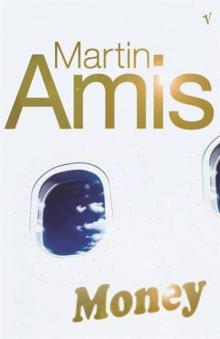 Money
Money The Moronic Inferno and Other Visits to America
The Moronic Inferno and Other Visits to America Yellow Dog
Yellow Dog Time's Arrow
Time's Arrow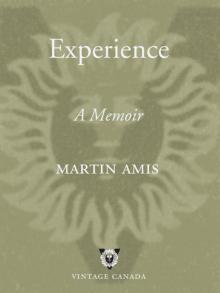 Experience: A Memoir
Experience: A Memoir Einstein's Monsters
Einstein's Monsters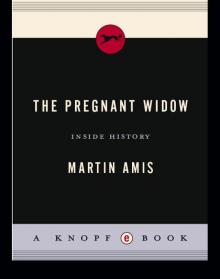 The Pregnant Widow
The Pregnant Widow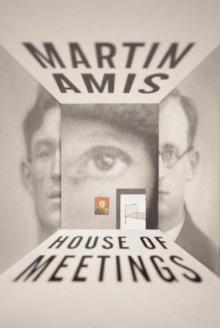 House of Meetings
House of Meetings The Information
The Information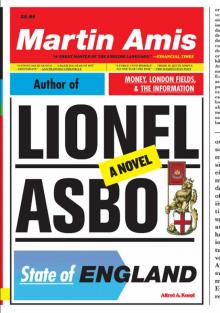 Lionel Asbo: State of England
Lionel Asbo: State of England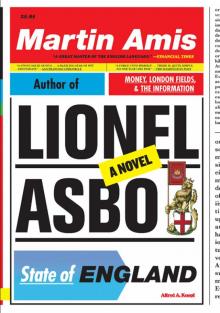 Lionel Asbo
Lionel Asbo Heavy Water and Other Stories
Heavy Water and Other Stories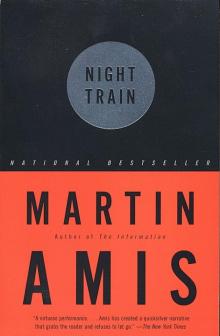 Night Train
Night Train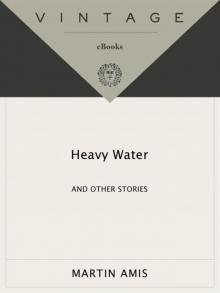 Heavy Water
Heavy Water The War Against Cliche: Essays and Reviews 1971-2000 (Vintage International)
The War Against Cliche: Essays and Reviews 1971-2000 (Vintage International)